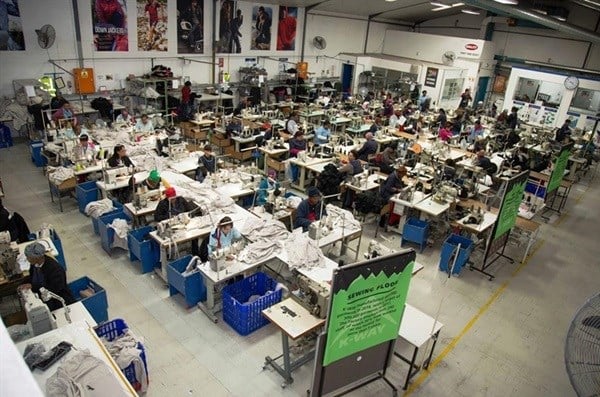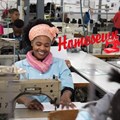
K-Way factory, Ottery, Cape Town.
K-Way was certainly not alone in its struggle at the time. South Africa’s clothing industry was in decline, faced with uneven competition against cheap imports from Asia; approximately 100,000 jobs had been lost during the previous decade and job security within the industry was becoming an elusive concept.
The search for solutions
K-Way chairman Philip Krawitz hired Bobby Fairlamb in 2004 and gave him one mandate: save the company. And that’s exactly what Fairlamb did, but it didn’t come about by doing ‘business as usual’.
“We were chasing efficiencies and squeezing assets. We needed to do something different to get a different result,” explained Fairlamb at the Source Africa conference and trade fair in Cape Town last week.
Soon after his appointment, he teamed up with individuals from some other companies that were facing similar hardships, and together they formed the Cape Clothing and Textile Cluster. The initiative was created to boost the competitiveness of the clothing, textile, footwear and leather (CTFL) manufacturing industry in the Western Cape.
As a group they would consult with experts, attend workshops and tour manufacturing plants across industries to learn what could be borrowed from these business models and applied to clothing. It was on their visits to car manufacturing plants in particular that Fairlamb was first introduced to ‘lean manufacturing’.
“We went into automotive companies in KZN and saw staff being empowered and rewarded for their input. I knew right there and then that I wanted a bit of that.”
Convinced of its potential to turn K-Way around, Fairlamb spearheaded the introduction of the lean manufacturing system at the company. With the reality that 87% of businesses fail on their lean journey, he admits the undertaking was a big risk for K-Way and for his personal career.
What is lean manufacturing?
Lean manufacturing is a team-based problem-solving methodology focusing on eliminating waste, with the ultimate goal of boosting production efficiency. According to Quality Digest, the core idea behind the lean system is maximising customer value while minimising waste, thereby achieving manufacturing excellence through the creation of more value with fewer resources.
Fairlamb said they realised that a large percentage of the work they were doing was non-value-adding, therefore classified as ‘waste’ in lean terms.
The seven deadly wastes of manufacturing are:
1. Waiting - Time spent waiting on something, or someone, to complete a task.
2. Motion - Any unnecessary movement of people that does not add value to the product or service.
3. Overprocessing - Using more energy or activity than is needed to produce a product.
4. Inventories and queues - Excess product waiting to be processed.
5. Transportation - Unnecessary movement to get goods from one process to the next.
6. Overproduction - Making more parts or information than is required.
7. Fixing defects and mistakes - Time spent repairing or reworking material or information.
Lessons learned
The company invested heavily in its workforce, providing staff across the board with ongoing skills training to improve their daily work procedures, methods and systems. This was combined with healthy working conditions and ensuring the management team was willing to listen to the ideas of all employees.
“We were going to have to work together to problem-solve. All businesses face problems, but we learnt to look at these problems as gold nuggets of opportunity to improve.”
Fairlamb listed the following as important lessons learned since implementing the lean system:
Total commitment from all stakeholders – If you want to be lean, everyone has to buy in, especially those at the top.
Park your ego, you’re not a superhero – Don’t stop asking questions and learning from your mistakes, and make sure that you're listening to all employees and harnessing their ideas.
Don’t wait for perfection – If you wait for a system that's perfect, that you'll never get started. Lean manufacturing is all about experimentation. If you're not making mistakes you're not trying hard enough.
Get a good lean coach – You need somebody in your business who understand the lean system and who drives its implementation within the company.
People are an important asset
Today, K-Way is Cape Union Mart’s biggest supplier, providing the retailer with half a million units last year alone. Fairlamb also noted that all staff now earn incentives on a regular basis and relationships with employees are at an all-time high.
“You can have the fanciest equipment and systems in the world, but people are your most valuable asset.”
“I realised that this lean journey was going to be a way of life. I knew that as management, we would have to lose our egos. I, for one, thought I was an exceptionally important part of the business, but I was wasting intellect by not using the brain power around me.”
Company culture affects everything, he said. Happy people are more productive.









































